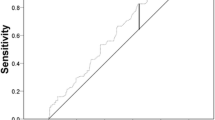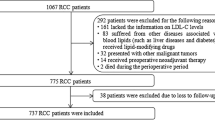Abstract
Background
The prognostic implications of preoperative serum total cholesterol (TC) level in patients with renal cell carcinoma (RCC) remain poorly understood. We investigated the prognostic role of preoperative serum TC in patients with surgically treated RCC from a large, multi-institutional Korean collaboration.
Patients and methods
A database of 3064 patients with RCC who underwent radical or partial nephrectomy between 1999 and 2011 at eight academic centers was analyzed. Preoperative serum TC levels were measured in fasting blood samples.
Results
Low preoperative serum TC level was associated with aggressive tumor characteristics, including large tumor size, advanced stage, high nuclear grade, lymph node involvement, and sarcomatous differentiation (all P < 0.001). Low TC level was associated with poor recurrence-free or cancer-specific survival (CSS) in the entire cohort, whereas the significance of the association changed after stratification by disease stage and histologic subtype. Multivariate Cox regression analysis showed that preoperative TC, as a continuous or categorical variable, was an independent predictor of CSS.
Conclusions
Preoperative low serum TC level was associated with aggressive tumor characteristics and poor CSS in patients with surgically treated RCC. Preoperative TC may provide additional guidance regarding the choice of therapeutic strategies to improve prognosis.


Similar content being viewed by others
References
Verhoest G, Veillard D, Guillé F et al (2007) Relationship between age at diagnosis and clinicopathologic features of renal cell carcinoma. Eur Urol 51(5):1298–1305
Chen L, Li H, Gu L et al (2015) The impact of diabetes mellitus on renal cell carcinoma prognosis: a meta-analysis of cohort studies. Medicine 94(26):e1055
Ljungberg B, Bensalah K, Canfield S et al (2015) EAU guidelines on renal cell carcinoma: 2014 update. Eur Urol 67(5):913–924
Lee HW, Jeon HG, Jeong BC et al (2015) Diagnostic and prognostic significance of radiologic node-positive renal cell carcinoma in the absence of distant metastases: a retrospective analysis of patients undergoing nephrectomy and lymph node dissection. J Korean Med Sci 30(9):1321–1327
Fujioka T, Obara W (2012) Evidence-based clinical practice guideline for renal cell carcinoma: the Japanese Urological Association 2011 update. Int J Urol 19(6):496–503
Donat SM, Diaz M, Bishoff JT et al (2013) Follow-up for clinically localized renal neoplasms: AUA guideline. J Urol 190(2):407–416
Ha Y-S, Kim WT, Yun S-J et al (2013) Multi-institutional analysis of localized renal cell carcinoma that demonstrates the impact of diabetic status on prognosis after nephrectomy. Ann Surg Oncol 20(11):3662–3668
Psutka SP, Stewart SB, Boorjian SA et al (2014) Diabetes mellitus is independently associated with an increased risk of mortality in patients with clear cell renal cell carcinoma. J Urol 192(6):1620–1627
Choi Y, Park B, Jeong BC et al (2013) Body mass index and survival in patients with renal cell carcinoma: a clinical-based cohort and meta-analysis. Int J Cancer 132(3):625–634
Parker AS, Lohse CM, Cheville JC et al (2006) Greater body mass index is associated with better pathologic features and improved outcome among patients treated surgically for clear cell renal cell carcinoma. Urology 68(4):741–746
Bono P, Elfving H, Utriainen T et al (2009) Hypertension and clinical benefit of bevacizumab in the treatment of advanced renal cell carcinoma. Ann Oncol 20(2):393–394
Drabkin HA, Gemmill RM (2012) Cholesterol and the development of clear-cell renal carcinoma. Curr Opin Pharmacol 12(6):742–750
Zhang C, Yu L, Xu T et al (2013) Association of dyslipidemia with renal cell carcinoma: a 1:2 matched case–control study. PLoS One 8(3):e59796
Ohno Y, Nakashima J, Nakagami Y et al (2014) Clinical implications of preoperative serum total cholesterol in patients with clear cell renal cell carcinoma. Urology 83(1):154–158
Martino M, Leitner CV, Seemann C et al (2015) Preoperative serum cholesterol is an independent prognostic factor for patients with renal cell carcinoma (RCC). BJU Int 115(3):397–404
Eckel RH, Grundy SM, Zimmet PZ (2005) The metabolic syndrome. Lancet 365(9468):1415–1428
Byun S-S, Hong SK, Lee S et al (2016) The establishment of KORCC (KOrean Renal Cell Carcinoma) database. Invest Clin Urol 57(1):50–57
Edge SB, Compton CC (2010) The American Joint Committee on Cancer: the 7th edition of the AJCC cancer staging manual and the future of TNM. Ann Surg Oncol 17(6):1471–1474
Fuhrman SA, Lasky LC, Limas C (1982) Prognostic significance of morphologic parameters in renal cell carcinoma. Am J Surg Pathol 6(7):655–664
Zhang G-M, Zhu Y, Ye D-W (2014) Metabolic syndrome and renal cell carcinoma. World J Surg Oncol 12(1):236
Dandona P, Aljada A, Chaudhuri A et al (2005) Metabolic syndrome. Circulation 111(11):1448–1454
Cheville JC, Lohse CM, Zincke H et al (2003) Comparisons of outcome and prognostic features among histologic subtypes of renal cell carcinoma. Am J Surg Pathol 27(5):612–624
Srigley JR, Delahunt B, Eble JN et al (2013) The International Society of Urological Pathology (ISUP) Vancouver classification of renal neoplasia. Am J Surg Pathol 37(10):1469–1489
Takagi K, Yagi T, Umeda Y et al (2017) Preoperative Controlling Nutritional Status (CONUT) score for assessment of prognosis following hepatectomy for hepatocellular carcinoma. World J Surg 41(9):2353–2360
Ishihara H, Kondo T, Yoshida K et al (2017) Preoperative controlling nutritional status (CONUT) score as a novel predictive biomarker of survival in patients with localized urothelial carcinoma of the upper urinary tract treated with radical nephroureterectomy. Urol Oncol. doi:10.1016/j.urolonc.2017.04.012
Ko K, Park YH, Lee JW et al (2013) Influence of nutritional deficiency on prognosis of renal cell carcinoma (RCC). BJU Int 112(6):775–780
Toyokawa T, Kubo N, Tamura T et al (2016) The pretreatment Controlling Nutritional Status (CONUT) score is an independent prognostic factor in patients with resectable thoracic esophageal squamous cell carcinoma: results from a retrospective study. BMC cancer 16(1):722
Haddad AQ, Jiang L, Cadeddu JA et al (2015) Statin use and serum lipid levels are associated with survival outcomes after surgery for renal cell carcinoma. Urology 86(6):1146–1152
McKay RR, Lin X, Albiges L et al (2016) Statins and survival outcomes in patients with metastatic renal cell carcinoma. Eur J Cancer 52:155–162
Chae YK, Yousaf M, Malecek M-K et al (2015) Statins as anti-cancer therapy; can we translate preclinical and epidemiologic data into clinical benefit? Discov Med 20(112):413–427
Acknowledgments
This research was supported by the Basic Science Research Program through the National Research Foundation of Korea (NRF) funded by the Ministry of Education (2015R1D1A1A01057786).
Author information
Authors and Affiliations
Consortia
Corresponding authors
Ethics declarations
Conflict of interest
The authors have no potential conflicts of interest to disclose.
About this article
Cite this article
Kang, H.W., Seo, S.P., Kim, W.T. et al. Low preoperative serum cholesterol level is associated with aggressive pathologic features and poor cancer-specific survival in patients with surgically treated renal cell carcinoma. Int J Clin Oncol 23, 142–150 (2018). https://doi.org/10.1007/s10147-017-1172-4
Received:
Accepted:
Published:
Issue Date:
DOI: https://doi.org/10.1007/s10147-017-1172-4




